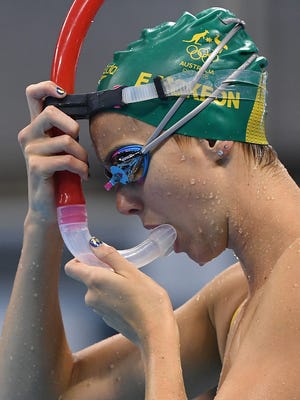Australian swimming coach complains of 'soupy' water in training pool
RIO DE JANEIRO — The water quality controversy surrounding the Rio Olympics extended to the indoor Aquatics Center on Thursday when an Australian swimming coach refused to let his athletes practice in the main Games training pool due to fears of infection.

Michael Bohl, one of the leading coaches on Australian team, became concerned when he saw the training pool in Barra da Tijuca become “cloudy” and “soupy” during the afternoon, less than two days before the start of the swimming program.
Bohl’s group, which included backstroke world champion Mitch Larkin and butterflyers Emma McKeon and Grant Irvine, had booked a session in the training pool and would have had uninterrupted use of it. Instead, they switched to the far busier main competition pool before undertaking their laps.
“That pool looked really cloudy so rather than risk and eye or ear or nose infections we came in here (to the main pool),” Bohl told reporters. “People were swimming in it but I just thought for these guys — it started out nice in that pool, but all of a sudden as (time) wore on the water just got really soupy looking.”
Rio has taken a beating, but can it rebound?
Bohl contacted officials from world swimming governing body FINA, and claimed that he had been told the situation would be investigated.
According to Australian media group News Limited, Australian team officials will seek assurances from Olympic chiefs as to what measures will be taken to ensure there is no repeat of Thursday’s saga.
Bohl said he had no issue with the “pristine” water quality of the main pool that will be use for the actual races.
Armour: Problems and promise — 6 story lines for the Rio Olympics
However, the state of the training pool is also of importance ahead of Saturday’s commencement of the meet, as it will be used by athletes to prepare for their races.
Previously, water quality issues at the Olympics had been restricted to pollution problems in the Guanabara Bay, where the rowing, sailing and open water swimming events will take place.